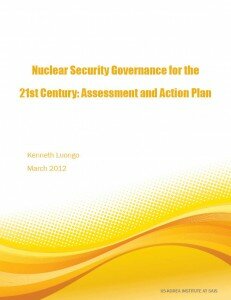 The upcoming Nuclear Security Summit (NSS) in Seoul, South Korea, will raise the international profile of the threat of nuclear terrorism and focus attention on the need to better secure weapons-usable nuclear materials in all corners of the globe. It follows the first NSS held in March 2010 in Washington, DC. Another summit will be held in the Netherlands in 2014. This sequencing of biennial, high-level international political summits has underscored the global importance of addressing the threat of nuclear terrorism. As a result, the NSS has the potential to become the preeminent international forum where the state of global nuclear material security is evaluated and where new commitments are made to improve the world’s defenses against nuclear terrorism. But, to fully realize its potential, the NSS process will need to evolve and participating countries must be willing to accept changes that will strengthen the nuclear material security regime.
The upcoming Nuclear Security Summit (NSS) in Seoul, South Korea, will raise the international profile of the threat of nuclear terrorism and focus attention on the need to better secure weapons-usable nuclear materials in all corners of the globe. It follows the first NSS held in March 2010 in Washington, DC. Another summit will be held in the Netherlands in 2014. This sequencing of biennial, high-level international political summits has underscored the global importance of addressing the threat of nuclear terrorism. As a result, the NSS has the potential to become the preeminent international forum where the state of global nuclear material security is evaluated and where new commitments are made to improve the world’s defenses against nuclear terrorism. But, to fully realize its potential, the NSS process will need to evolve and participating countries must be willing to accept changes that will strengthen the nuclear material security regime.
The NSS process has had the foresight to address the clear and dramatic danger posed by nuclear terrorism in advance of any such shocking event. But this strategy of focusing attention on the prevention of nuclear terrorism requires policies and requirements to be stronger than those that the Washington Summit, and likely the Seoul Summit, will require. It requires the development of an international nuclear security regime that emphasizes transparency of action, shared standards, and confirmed performance and accountability by nations.
In this paper, Kenneth Luongo (Partnership for Global Security) outlines the various elements of the current nuclear security regime, and suggests a new and comprehensive architecture that emphasizes demonstrated performance and accountability with clear but flexible standards.
Kenneth N. Luongo is the President of the Partnership for Global Security (PGS). Prior to this position, Mr. Luongo served as the Senior Advisor to the Secretary of Energy for Nonproliferation Policy and the Director of the Office of Arms Control and Nonproliferation at the US Department of Energy. In addition, Mr. Luongo served as the Director of the Department of Energy’s North Korea Task Force and as Director of the Russia and Newly Independent States Nuclear Material Security Task Force.
For other papers in this series, visit our NSS Working Paper Series page.
For additional resources on the Seoul Nuclear Security Summit and the NSS process, visit our NSS Program page.
DOWNLOADS
- Kenneth Luongo, “Nuclear Security Governance for the 21st Century: Assessment and Action Plan,” USKI Working Paper Series, US-Korea Institute at SAIS: Johns Hopkins University, March 2012. (PDF, 28pp)



